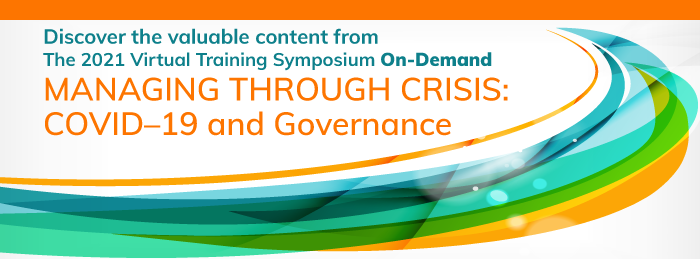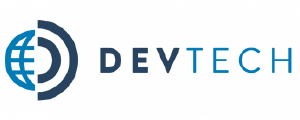|

The ICGFM 2021 Virtual Training Symposium originally broadcast in February 2021 over two half-days is now available on demand! This LIVE recorded broadcast offers the chance to learn from leading experts during seven panel presentations, a unique 2-part Innovation Roundtable plus watch a captivating closing presentation by Srinivas Gurazada from PEFA.
Full Package Price:
$225 Member | $75 Student | $325 Non-member
Interested in one session and not the whole package? A single session may be purchased for $45 members ($55 non-members) each. Please contact [email protected] for more information.
FULL PACKAGE DETAILS
The following are the sessions you will have access to:
Day 1 Sessions
|
Welcome and Opening Remarks
Dave Pearl, President, ICGFM
John Thissen, Vice-President for Programs, ICGFM
Laura Robinson, Vice-President for Training, ICGFM
|
|
Tools to Help Countries Plan for Complex Crises: The Impact of COVID-19 Shutdowns on Economies, Jobs, and Poverty
The COVID-19 crisis is a health crisis and an economic crisis. Indeed, our economies are suffering from a medically induced coma. Travel, entertainment, getting goods to market and even food processing have all taken serious hits, resulting in massive job loss and rises in poverty. We present here two of the tools we developed for USAID to assess and quantify the impacts of COVID-19 on partner country economies and incomes; job losses and rises in poverty among men and women; and the macroeconomic resilience of these countries or their relative capacity to overcome these impacts. DevTech developed these tools as part of the work of USAID’s worldwide Fiscal Accountability and Sustainable Trade (FAST) project.
Moderator
John Yates, Executive Director of Public Finance, DevTech Systems, Inc.
Panelists
Mark Gallagher, Ph.D., Chief of Party of the USAID Fiscal Accountability and Sustainable Trade (FAST), DevTech Systems, Inc.
Welmar Rosado, Ph.D., Deputy Chief of Party of the USAID, Fiscal Accountability and Sustainable Trade (FAST), DevTech Systems, Inc.
|
|
Optimizing Public Value Through Risk Management
Public sector risk management is the process of managing the impact of uncertainty on varying aspects of public value. The panel will discuss public sector risk management from a global framework perspective, from the perspective of a country rolling out a government-wide risk management guideline, and from the perspective of a practitioner in crisis management and business continuity planning. The discussion will center around the critical need to protect, create, and reimagine public value, globally, in 2021 and how risk management can assist in encouraging diverse parties to pull in the same direction in this Herculean effort. The panel will also touch on the tools and mechanisms to enact risk management programs in resource-efficient ways.
Moderator
Laura Robinson, President & CEO, Swale House Partners
Panelists
Paul Sobel, Chairman, Committee of Sponsoring Organizations (COSO)
Fredrick Riaga, CEO, Public Sector Accounting Standards Board of Kenya
|
|
Fraud Risks in the Pandemic: Perspective, Method, and a Case Study
This panel, presented by the U.S. Agency for International Development, Office of Inspector General (USAID OIG), will address fraud risks in the current COVID-19 pandemic. Speakers will discuss challenges faced by fraud investigators in the pandemic and attempts to overcome them, as well as historic parallels. They will also discuss specific initiatives and efforts that USAID OIG has taken during the pandemic to advance its oversight mission. Finally, USAID OIG will present a case study of a successful investigation, which led to the recovery of approximately $3 million in ventilators that had been stolen in the U.S. state of Florida en route to their destination in El Salvador.
Moderator
Alvin Brown, Deputy Assistant Office of Inspector General for Audit, USAID
Panelists
Chloe Sedlak, Investigative Analyst, USAID, Office of Inspector General, Office of Investigations Africa, Europe, Latin America and Caribbean Division
Tyler M. Scheufele, CFE, Special Agent/Team Lead, USAID Office of the Inspector General, Office of Investigations Latin America and Caribbean & Venezuelan Oversight and Monitoring Task Force (Venom)
Mark Day, Special Agent in Charge of the USAID Office of Inspector General Africa, Latin America Caribbean & European Division
|
|
Crowd-Sourced Innovation Roundtable
COVID 19 has caused massive change not just because of the pandemic itself, but from the global and local responses, and the recovery. But with change comes opportunity. Based on participant feedback, moderators Richard Chambers, John Thissen, and Laura Robinson will facilitate a lively discussion around new ideas and new ways of implementing existing ideas to promote public value, efficient service delivery and improvements in governmental financial management. Join the roundtable and come away informed, inspired, and energized!
Moderators
Richard Chambers, Board Member, ICGFM, President & CEO, The Institute for Internal Auditors
John Thissen, Vice-President for Programs, ICGFM
Laura Robinson, Vice-President for Training, ICGFM
|
|
Wrap-up Day 1
John Thissen, Vice-President for Programs, ICGFM
Laura Robinson, Vice-President for Training, ICGFM
|
Day 2 Sessions
|
Welcome Back Day 2 Remarks
Dave Pearl, President, ICGFM
|
|
COVID-19 and Governance
The pandemic has led to challenges in the public procurement landscape as governments strive to deliver front-line services and emergency procurements by fast-tracking expenditure procedures, utilizing exemptions within the law, and accelerating electronic services to reduce face-to-face interactions. This panel session provides country case studies and examples on how accelerated competitive procurements, electronic procurement tools, transparency, and accountability mechanisms for reporting, and increased capacity building, can contribute to transparent and accountable procurements, while promoting integrity, fairness, and confidence in public procurement processes during the COVID-19 pandemic. The panel provides experiences from three USAID-funded projects that have been at the forefront of technical assistance in public financial management, public procurement, and fiscal transparency, supporting COVID-19 response policies and service delivery.
Moderator
Eunice Heredia-Ortiz, Ph.D., Senior Principal Development Specialist, Governance, Public Financial Management (PFM) and Fiscal Transparency, DAI
Panelists
Darrell Freund, Senior Principal Global Practice Specialist, Governance Sector, Advisor to USAID’s Accelerating Support to Advance Local Partners (ASA) Project, DAI
Enrique Giraldo, Chief of Party, USAID’s El Salvador Domestic Resource Mobilization (DRM) Project, DAI
Aferdita Mekuli, Chief of Party, USAID’s Kosovo Transparent, Effective, and Accountable Municipalities (TEAM) Project, DAI
|
|
Budgeting in Uncertain Times
2021 brings significant uncertainty in government revenues and expenditures. Governments are forced to make decisions with less information and greater uncertainty regarding the needs and resources of tomorrow in the government structures and rules of yesterday. Budget Directors are positioned in the nexus of the challenge. The panelists will discuss the uncertainty in government revenues and expenses in their countries, the expectations from stakeholders in 2021 and beyond, areas that are protected with policy or law, and mechanisms to balance more flexible governance with effective oversight. The panel will also touch on the areas of opportunity to improve governance and service delivery in the midst of the challenge.
Moderator
Aleksi Aleksishvili, Chairman of the Policy and Management Consulting Group (PMCG), Former Minister of Finance and Economy of Georgia
Panelists
Sonya Roopnauth, Director, Office of the Budget Agency, Ministry of Finance, Guyana
Shelby Kerns, Executive Director of the National Association of State Budget Officers (NASBO)
Ekaterine Guntsadze, Head of Budget Department, Ministry of Finance of Georgia
Elmazi Salvador, Director of Kosovo Budget Department
|
|
Deploying Digital Technologies to Support Resilient Public Financial Management: A Case Study — Building a Strong Tunisia During Covid-19
This presentation will use the example in Tunisia to demonstrate that by harnessing the power of data-driven digital technologies — business intelligence tools, secure data exchange technology, dashboards, decision support systems, and models — the country is now better prepared to face the unique public financial management-related challenges brought on by the pandemic.
When the COVID-19 pandemic reached Tunisia in March 2020, the Tunisian authorities ordered a national lockdown. The Tunisian Ministry of Finance reached out to the United States Agency for International Development (USAID) to accelerate the digital transformation that was already underway to improve public financial management. The USAID Fiscal Reform for a Strong Tunisia (FIRST) project sprang into action to assist Government of Tunisia officials in being virtually connected; develop priority web applications to enable the remote payment of taxes and automatic electronic tax withdrawals; complete the implementation of an inter-operability platform to allow different institutions involved in budget planning to share data electronically; and use models and data to make projections of the potential budget and economic impacts of the pandemic.
Moderator
John Thissen, Senior Director, Public Financial Management, Economics Growth and Trade, Chemonics International
Panelists
Mario Kerby, Senior Director, Middle East and North Africa Region, Chemonics International
Janusz Szyrmer, Tax Policy Team Leader, USAID Fiscal Reform for a Strong Tunisia
|
|
Closing Keynote: Public Financial Management for Sustainable Public Finances in a Post COVID-19 World
Public Financial Management (PFM) is at a crossroads with demands for realignment with post-COVID-19 requirements. The unprecedented increase in government debt, fall in revenues and higher fiscal spending by governments place greater emphasis on sustainable public finances. Health and education sectors are emerging as key focus sectors to be ‘built back better’ leading to expectations that PFM systems support improved service delivery. PFM systems are gaining significance to support specific policy objectives of climate and gender. In this background, PFM systems need to be responsive and flexible, while ensuring value for money and minimizing fraud and corruption. They need to support progress towards Sustainable Development Goals. Public Expenditure and Financial Accountability (PEFA), an initiative of nine development partners, is known as the gold standard for Public Financial Management assessments globally. The PEFA assessment reports from 153 countries provide interesting trends on the evolution of PFM systems globally. The keynote will trace the evolving global trends in PFM systems over the past two decades, discuss the country level innovations taking place during the COVID-19 crisis and present options on improved alignment to a post COVID-19 world.
Speaker
Srinivas Gurazada, Head, PEFA Secretariat & Global Lead Public Financial Management
|
|
Innovation Roundtable Wrap-up
Richard Chambers, Board Member, ICGFM, President & CEO, The Institute for Internal Auditors
John Thissen, Vice-President for Programs, ICGFM
Laura Robinson, Vice-President for Training ICGFM
|
|
Final Wrap-up
Dave Pearl, President, ICGFM
|
NOTE: To view speaker biographies, please click on their name.
Thank You to ICGFM Partners Who Sponsored the 2021 Training Symposium:
FOUNDATION PARTNERS


PARTICIPATING PARTNERS
 
|






